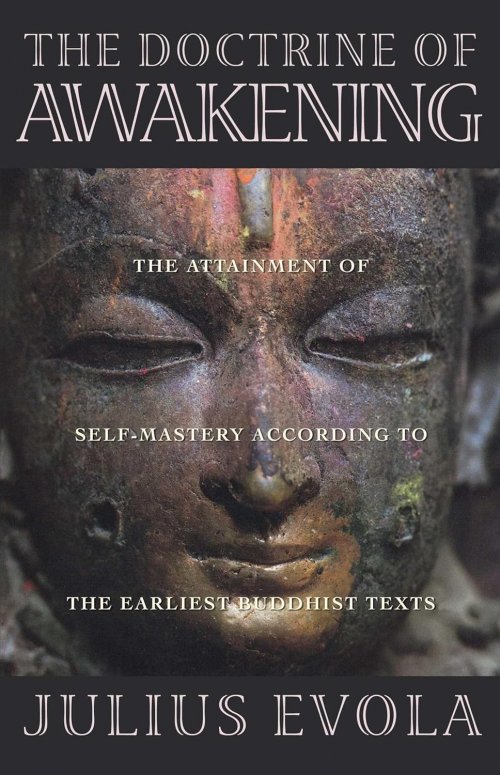In the midst of a world engulfed in the flames of World War II and a tragic civil war in Italy, Julius Evola published his Doctrine of Awakening in 1943. This book, which delves into the depths of Buddhist thought and explores the nature of spirituality and tradition, is a testament to Evola’s ability to transcend the limitations of his time and challenge the modern world’s rejection of traditional values.
Evola’s Doctrine of Awakening is primarily concerned with presenting a unique perspective on Buddhist asceticism that challenges the Western view of the religion. By focusing on the origins of the Buddha as a prince and heir to the throne of Kapilavastu, Evola dispels the notion that Buddhism is a religion for the weak or the resigned. Instead, he presents it as a path of spiritual struggle that is no less heroic than the physical battles fought by knights on the battlefield.
In this article, we will explore the key elements of Evola’s Doctrine of Awakening and examine how they challenge the modern world’s rejection of traditionalism. We will also discuss the ways in which Evola’s ideas have had a lasting impact on Western thought and continue to shape the way we think about the nature of tradition and the decline of Western civilization.
The Origins of the Buddha and the Nature of Asceticism
One of the most striking aspects of Evola’s Doctrine of Awakening is its emphasis on the origins of the Buddha as a prince and heir to the throne of Kapilavastu. By recalling the Buddha’s noble origins, Evola dispels the notion that Buddhism is a religion for the weak or the resigned. Instead, he presents it as a path of spiritual struggle that is no less heroic than the physical battles fought by knights on the battlefield.
Evola’s focus on the Buddha’s noble origins is particularly noteworthy given his aristocratic background and his commitment to traditionalism. By highlighting the Buddha’s origins as a prince, Evola is able to challenge the modern world’s rejection of traditional values and present Buddhism as a path for the strong and the courageous.
Evola’s emphasis on the nature of asceticism is also an important aspect of his Doctrine of Awakening. He argues that the original meaning of the term asceticism is “practical exercise” or “discipline,” and that it is not about mortifying the body or seeking penance. Instead, Evola presents asceticism as a school of the will, a pure heroism that is disinterested and focused solely on the challenge of overcoming natural resistances.
Evola’s comparison of asceticism to the efforts of a mountain climber is particularly noteworthy, as it highlights the importance of perseverance and courage in the spiritual domain. By presenting asceticism as a path of spiritual struggle that is no less heroic than the physical battles fought by knights on the battlefield, Evola is able to challenge the modern world’s rejection of traditional values and present Buddhism as a path for the strong and the courageous.
The Rejection of Passivity and Pessimism
Evola’s Doctrine of Awakening is also notable for its rejection of the idea that Buddhism is a passive and pessimistic religion. He argues that the Buddha’s teachings are not about resignation but about taking action towards victory. Evola’s emphasis on the importance of duty and disinterested action is also a reminder of the values shared by the itinerant knights of the Western Middle Ages.
Evola’s rejection of passivity and pessimism is particularly important given the challenges of his time. In the midst of a world engulfed in the flames of World War II and a tragic civil war in Italy, it would have been easy for Evola to adopt a passive and pessimistic outlook. However, by focusing on the importance of action and duty.
Evola’s Impact on Western Thought
Evola’s ideas have also had a profound influence on philosophy, politics, and religion. His commitment to traditionalism and the rejection of modernity has inspired a wide range of thinkers and scholars, and his legacy continues to shape the way we think about the nature of tradition and the decline of Western civilization.
As we continue to grapple with the challenges of the modern world and the decline of Western civilization, Evola’s Doctrine of Awakening serves as a reminder of the importance of tradition and the power of spiritual struggle. By exploring the depths of Buddhist thought and presenting it in a way that is accessible and relevant to a Western audience, Evola has left a lasting legacy that continues to inspire and challenge thinkers and scholars today.
In this thought-provoking work, Evola challenges the reader to question the values and beliefs that have been imposed upon them by the modern world and to seek a deeper understanding of the spiritual essence that has been lost in their time. Evola’s commitment to traditionalism and the rejection of modernity has inspired generations of thinkers and scholars, and his legacy continues to shape the way we think about the nature of tradition and the decline of Western civilization.
“Doctrine of Awakening” is a must-read for anyone seeking to reconnect with the timeless principles of traditional societies and to explore the depths of spirituality and the human condition. Evola’s insights and reflections on Buddhism, traditionalism, and the decline of Western civilization offer a unique perspective on the challenges and opportunities that lie ahead for those who seek to reclaim the authority of tradition and the spiritual essence that has been lost in the modern world.
Still available at Amazon.com and Amazon.de






